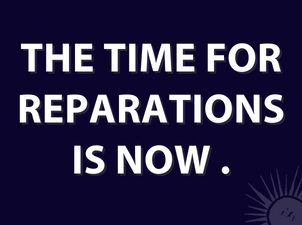
Hopes for a Reparations Commission Moves to the White House
Julia Morris
June 1, 2022
 For over a year the drum beat for reparations has been building. After 30 years of Congressional delays, for the first time on January 4, 2021 H.R. 40 made it out of committee and onto the House floor. House leadership knows this will not pass in the Senate, so the pressure is now on the Biden Administration to establish a committee to execute a reparations study, which will lay out the plan to make amends for the United States original sin of slavery and the systemic racial oppression that followed. Reparatory justice activists, social justice groups, and faith-based organizations are urging the Biden Administration this spring to finally follow through on a commitment made on the 2020 campaign trail. The Biden-Harris campaign promised, in ‘Lift Every Voice: The Biden Plan for Black America’, to tackle systemic racism and the continuing impacts of slavery by “supporting a study of reparations.”
For over a year the drum beat for reparations has been building. After 30 years of Congressional delays, for the first time on January 4, 2021 H.R. 40 made it out of committee and onto the House floor. House leadership knows this will not pass in the Senate, so the pressure is now on the Biden Administration to establish a committee to execute a reparations study, which will lay out the plan to make amends for the United States original sin of slavery and the systemic racial oppression that followed. Reparatory justice activists, social justice groups, and faith-based organizations are urging the Biden Administration this spring to finally follow through on a commitment made on the 2020 campaign trail. The Biden-Harris campaign promised, in ‘Lift Every Voice: The Biden Plan for Black America’, to tackle systemic racism and the continuing impacts of slavery by “supporting a study of reparations.”
You may ask what would this look like? A commission will study the impact of 400+ years of racist policies, laws, and practices that have deprived Blacks fair access to participation in America’s cultural, political, social and economic life. Join NETWORK in calling for President Biden to establish a commission to study reparations via executive order, call the White House at 1-888-422-4555 or email the White House here.
The commission would evaluate programs like the Homestead Act and the GI Bill. Both were federal programs designed to help families achieve economic footing in times of change. The Homestead Act granted land out West at the turn of the 20th Century, and the GI Bill helped forge the middle class after World War II with home buying and educational opportunities for veterans These programs paved the way for the US middle class, it was not accidental or unintentional that these programs were denied to Black families. In fact, today schools are more segregated now that they were at the time of Brown vs. Board of Education.
Chattel slavery was abolished in 1865, but because of the legacy of discrimination that flows from slavery, the Black community continues to suffer. For too long in this country, the expectation and delivery of better housing, education, jobs – has only been a reality for white families. The legacy of being Black is discrimination and oppression. We see it in our societal frameworks, access to fair wages and quality employment, the criminal legal system
What is not named cannot be healed. This is a historic opportunity to, using the frame of the Catholic tradition, name our original sin of slavery and move towards repair.
NETWORK is joining with partner organizations to urge President Biden to create a federal commission to study reparations by Juneteenth (June 19, 2022). Add your voice, call the White House at 1-888-422-4555. Or email President Biden to issue an executive order to create a federal commission to study reparations today!







